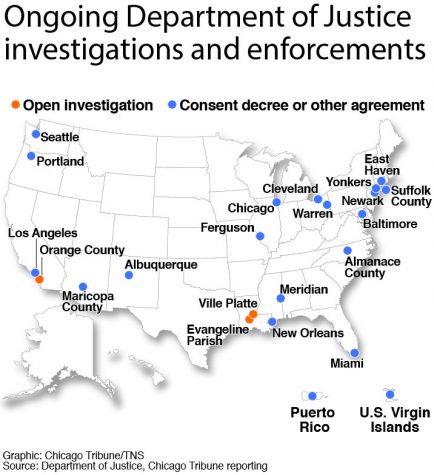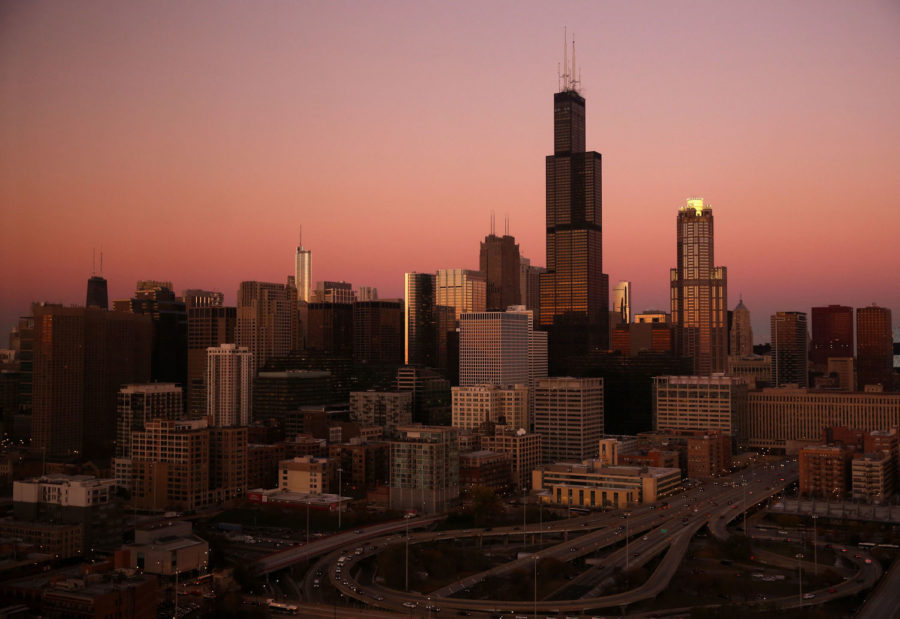Chicago police use excessive force, result of poor training and lack of discipline
January 14, 2017
In perhaps the most damning, sweeping critique ever of the Chicago Police Department, the U.S. Department of Justice concluded Friday that the city’s police officers are poorly trained in the use of force, resort to lethal force far too often and target minorities too frequently.
The 164-page report, the product of more than a year of investigation, paints the picture of a department flawed from top to bottom, although many of the problems it cites have, for decades, been the subject of complaints from citizens, lawsuits by attorneys and investigations by news organizations.
As such, the report is an indictment of sorts of city officials who, the report said, have paid lip service to the community’s complaints as well as the need for reform of the Police Department and the various city agencies responsible for its oversight.
Advertisement
The report cites a pervasive “code of silence” that leads officers to lie to protect themselves and colleagues. Disciplinary authorities, in turn, have rarely brought cases against officers who lied, even when their statements were contradicted by video, while officers are almost never held accountable for even the worst shootings.
Although the vast majority of the report was critical of the police, it also suggested that officers were victims of a sort — desperate for change but poorly served by a lack of training that often put them in harm’s way.
But as much as the Justice Department suggested that most of the city’s 12,000 officers wanted to do better, it chronicled so many abuses that the report is yet another black eye for a department with a long, controversial history that includes torturing suspects and dozens of wrongful convictions. Indeed, the Justice Department’s report offered confirmation of a story often told about Chicago police — that they take gang members into rival territory to threaten them into cooperating.
The report hammered hard at how officers fail to de-escalate tense situations, often resulting in shootings that were avoidable and unnecessarily endangered officers as well. The Justice Department ripped officials responsible for investigating police shootings and other uses of force for failing to hold officers accountable or issue meaningful discipline.
Taken together, the Chicago Police Department’s flaws have “helped create a culture in which officers expect to use force and not be questioned about the need for or propriety of that use,” the Justice Department said in its report, made public Friday by U.S. Attorney General Loretta Lynch.
In response to the federal investigation, Chicago Mayor Rahm Emanuel has agreed to enter a court-enforced agreement with the Justice Department on a wide range of reforms, Lynch and other officials announced. While the report lauds some of the changes Emanuel has made to policing in recent months, it cautions that further reforms are needed and that real change is unlikely to last without outside monitoring.
What’s more, the report takes Emanuel to task for his efforts to get ahead of the report, saying some efforts have been misguided.
Advertisement*
For his part, the mayor continued to voice his backing of the federal investigation while at the same time insisting the report’s findings of systemic problems don’t portray most cops.
“The incidents described in this report are sobering to all of us,” he said. “Police misconduct will not be tolerated anywhere in the city of Chicago, and those who break the rules will be held accountable for their actions. Misconduct not only harms the individuals affected, it damages the reputation of the Chicago Police Department.
“At the same time, it is important to recognize that the incidents of misconduct cited in this report do not represent the values of the city of Chicago. And I believe firmly they do not represent the good work of the vast majority of the men and women of the Chicago Police Department, I said it earlier, who put their lives on the line every day.”

The U.S. Department of Justice announced on Friday its findings that the Chicago Police Department engaged in unlawful policing that violated the U.S. Constitution. The report lays the groundwork for a pending consent decree that includes specific reforms overseen by an outside monitor.
At a news conference, Lynch said the department’s pattern of how it uses excessive force “is in no small part the result of severely deficient training procedures and accountability systems.”
“CPD does not give its officers the training they need to do their jobs safely, effectively and lawfully,” Lynch said. “It fails to properly collect and analyze data, including data on misconduct complaints and training deficiencies, and it does not adequately review use-of-force incidents to determine whether force was appropriate or lawful or whether the use of force could’ve been avoided altogether.”
All of these issues, she added, have led to “low officer morale and erosion of officer accountability.”
The report was one response to the shooting of black teenager Laquan McDonald by white Officer Jason Van Dyke, the incident that became a flashpoint in police-community relations after the release of a video of the incident that Emanuel and city officials worked to keep from the public.
Besides addressing police shootings, it dealt with other police issues, such as how officers target minorities in enforcement and, in many instances, treat them badly and, in some cases, unconstitutionally: manhandling even children and holding them unless they can produce a gun, for instance.
The Justice Department was particularly critical of foot pursuits by officers, saying they too often end with unarmed individuals being shot, and also found officers shoot at vehicles without justification.
One of the report’s key findings echoed a contention black and Latino Chicagoans have made for decades _ that police unfairly target minorities. The report said DOJ investigators had “serious concerns about the prevalence of racially discriminatory conduct by some CPD officers.” Statistics cited by the DOJ show that CPD has used force almost 10 times more often against blacks than against whites.
Justice Department officials tracked the police department’s problems all the way to the police academy, where officers learn to be police but end up shooting people who pose no threat and using a Taser on people who simply didn’t follow verbal commands.
The report criticizes use-of-force training at the academy, noting that Justice Department investigators observed a training video made decades before that “was inconsistent with both current law and CPD’s own policies.” When officials spoke to recent academy graduates, only one in six “came close to properly articulating the legal standard for use of force.”
The report said that while Emanuel has widely expanded the department’s stock of Tasers, too many officers have been run through training programs too quickly, “without proper curriculum, staff or equipment.” As a result, according to the report, many officers are “uncomfortable with how to use Tasers effectively as a less-lethal force option — the very skill the training was supposed to teach.”
The report’s release marks a landmark for the country’s second-largest local police department and one of the last acts of President Barack Obama’s Justice Department. But the report comes as serious questions loom about the future of police reform nationwide. President-elect Donald Trump has supported aggressive law enforcement, and his nominee for attorney general, Alabama Republican Sen. Jeff Sessions, has criticized consent decrees.
Local activists and lawyers have voiced fears that Emanuel’s resolve to change policing will wane if Trump’s Justice Department relaxes its stance, but the mayor has said he’s committed to improving the 12,000-strong police force. During the 13-month investigation, Emanuel pressed changes in line with reforms that federal authorities have tended to seek in other departments: tightening use-of-force policies and stepping up training and discipline.
The report’s release answered a key lingering question as to whether Emanuel would agree to formal court supervision of reforms. In her statement, Lynch said the city had signed an agreement to work with federal officials on a consent decree. An independent monitor will oversee the process.
Winning the trust of the community, however, will not be easy. Chicago police, the report states, must show “communities racked with violence that their police force cares about them and has not abandoned them, regardless of where they live or the color of their skin.”
“That confidence is broken in many neighborhoods in Chicago,” the report says. Getting buy-in from rank-and-file officers, many of them overwhelmed by surging violence and weary of constant criticism, also will be difficult. But Superintendent Eddie Johnson said the department was working hard to regain the community’s trust and would continue to do so. He noted how the department has boosted its training of officers in the last year, including in crisis intervention, and how it solicited input from the public on a new use of force policy.
“Quite simply, as a department, we need to do better,” he said. “And you have my promise and commitment that we will do better.”
John Byrne and Steve Schmadeke contributed.
___
(c) 2016 the Chicago Tribune
Visit the Chicago Tribune at www.chicagotribune.com
Distributed by Tribune Content Agency, LLC.
Advertisement









